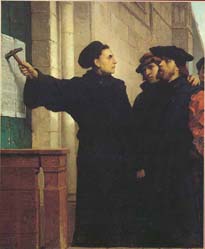The 95 Theses
On 31 October 1517, Martin Luther pinned the 95 Theses next to the sale of indulgences to the door of the main church in Wittenberg. Although Luther could never have foreseen the impact of this act, it served to trigger the German Reformation. The main idea of the 95 Theses was that the Church’s teaching on salvation were incorrect and that the Bible revealed God’s true will.

In his early years, Luther had accepted the teachings of the Church. However, over time they began to trouble him. He feared that he would never gain salvation, as leading a completely sin-free life was almost impossible. His despair worsened when, in 1517, the Dominican friar John Tetzel was empowered by the pope to fund the restoration of buildings in Rome by selling indulgences. Tetzel’s sermons became advertisements for the expensive indulgences, which would ensure the forgiveness of all the purchaser’s sins. It also promised the release of a loved one from purgatory. Churchgoers would sing:
“As soon as the coin in the coffer rings,
So the soul from purgatory springs.”
Luther felt that the Church was exploiting its members for its own gain. He saw it as an example of the “rottenness” of the Church.
The Church’s actions inspired Luther to write The 95 Theses. The pamphlet contained 95 points that he felt should be argued at an academic level.
Whether Luther intended for his pamphlet to be read by a wide audience is up for debate. On the one hand, it was written in Latin which was the traditional language of the scholar. Thus, few people in Wittenberg would have been able to read it.
On the other hand, the timing suggests that he was hoping for his arguments to receive wide publicity. The 95 Theses appeared only the day before the Elector of Saxony sold indulgences to visitors of his holy relics.
Even if Luther didn’t intend for it to happen, the 95 Theses were soon translated into German, printed and widely distributed. His ideas had wide appeal - scholars approved of the theory behind Luther’s arguments, and the public were happy to find they could have salvation regardless of their wealth.
Luther’s ideas spread across Germany through the traders that travelled through Wittenberg. Moreover, it helped that his ideas had a populist appeal.
See also: The 95 Theses - A Modern Translation
MLA Citation/Reference
"The 95 Theses". HistoryLearning.com. 2026. Web.
